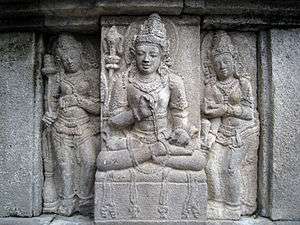Devata
Deva is the Hindu term for deity; however, devata (Devanagari: देवता; Khmer: ទេវតា (tevoda); Javanese, Balinese, Sundanese, Malay: dewata; Batak languages: debata (Toba), dibata (Karo), naibata (Simalungun); Philippine languages: diwata) is a smaller, more focused deva. The term "devata" can also mean deva (pl: devatas, meaning the gods). There are male and female devatas. There are many kinds of devatas: vanadevatas (forest spirits, perhaps descendants of early nature-spirit cults), gramadevata (village gods), devatas of river crossings, caves, mountains, and so on. In Hinduism, the devatas that guard the eight, nine and ten cardinal points are called Lokapala (Guardians of the Directions) or, more specifically in ancient Java tradition, Dewata Nawa Sanga (Guardians of Nine Directions). Every human activity has its devata, its spiritual counterpart or aspect.
Types of devatas
Hindu devatas, for example in the Konkan region, are often divided into five categories:[1]
- Grama devatas or village deities who could be the founder deity such as Jathera or ancestral worship of Bali, and examples include Hanuman, Kalika, Amba, Bhairava.
- Sthana devatas or local deities, for example, those in certain places of pilgrimage like Rama in Nasik, Vithoba in Pandharpur or Krishna at Dwarka.
- Kula devatas or family deities, like Khanderai.
- Ishta devatas or chosen deities
- Vastu devatas or Gruha devatas, a class of deities that preside over the house.
In scriptures
Some well-known Hindu-Buddhist heavenly beings belong to the group of devatas, such as apsaras or vidhyadaris (female cloud and water spirits) and their male counterparts, the gandharvas (heavenly musicians). Devatas often occur in Hindu epics such as the Ramayana and the Mahabharata and some Buddhist holy scriptures.
The island of Bali is nicknamed Pulau Dewata (Indonesian: "islands of devata or island of gods") because of its vivid Hindu culture and traditions. In Indonesia, the term hyang is equivalent to devata.
See also
References
- R.E. Enthoven; A. M. T. Jackson (1915). Folklore Notes, Vol. 2, Konkan. Bombay: British India Press, Mazgaon.
- Palani, Sivasiva. "New Angles On Angels." Hinduism Today, Sep 1992. Accessed 11 May 2006.
- Krishna, Nanditha. "Grounded in wisdom." Newindpress on Sunday, April 26, 2003. Accessed 11 May 2006.
- Chopra, Deepak: Life after Death, The Burden of Proof, Chapter 11 "Guides and Messengers" Three Rivers Press, 2008.

